

The Most Biased Name in News. Media Bias Is Real, Finds UCLA Political Scientist. While the editorial page of The Wall Street Journal is conservative, the newspaper's news pages are liberal, even more liberal than The New York Times.
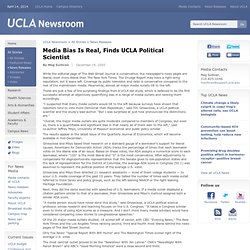
The Drudge Report may have a right-wing reputation, but it leans left. Coverage by public television and radio is conservative compared to the rest of the mainstream media. Meanwhile, almost all major media outlets tilt to the left. Fox News. The Fox News Channel (FNC) is a cable news channel owned by Rupert Murdoch's News Corporation and Saudi Arabian Prince Alwaleed bin Talal[1]; it is considered by many as a quasi-arm of the Republican party or at least the right wing movement.[2] Surveys have found that Fox News viewers have more misconceptions than those who get their news from other media outlets.[3] History FNC was launched in October 1996 and, according to Fox, as of August 2003 "has over 80 million subscribers throughout the United States.
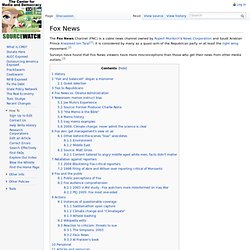
Fox News Bias. FOX News Bias Evidence. FOX News Channel Bias For Daily Updates and information about Bill O'Reilly, FOX news, the corporate media, and the crooked republicans in the White House, visit the oreilly-sucks Forum. You can get to it through the Forums link on the main page or Click Here. Powered by Google Docs. The objectivity norm in American journalism* World’s foremost premium research database service. SPJ Code of Ethics. SPJ Code of Ethics Revised September 6, 2014 at 4:49 p.m.
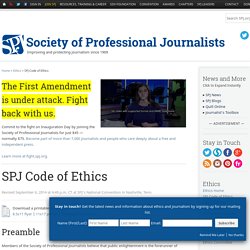
CT at SPJ’s National Convention in Nashville, Tenn. Download a printable copy [PDF]:8.5x11 flyer | 11x17 poster | Two-sided bookmark Preamble. Electronic Journalism and International Editing Standards. Participants also learned how to write and adapt stories for news Web sites examined and compared news Web sites from Arabic-speaking countries and from countries around the world.Photo by Hoda Osman In cooperation with the Prince Ahmed bin Salman Applied Media Institute, ICFJ conducted its first training courses in Saudi Arabia entitled Electronic Journalism and International Editing Standards.
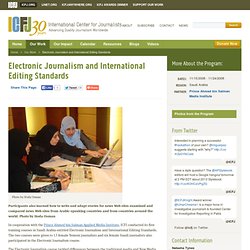
Tools and Resources (for all) Part I: The Origins of Copyright By J.S.
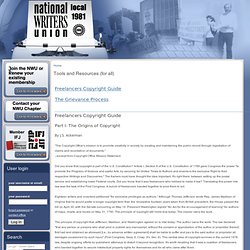
Ackerman "The Copyright Office's mission is to promote creativity in society by creating and maintaining the public record through registration of claims and recordation of documents. " --excerpt from Copyright Office Mission Statement Did you know that copyright is part of the U.S. Mission. The Online News Association is composed largely of professional digital journalists.
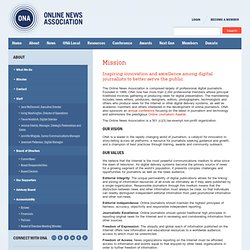
Founded in 1999, ONA now has more than 2,000 professional members whose principal livelihood involves gathering or producing news for digital presentation. The membership includes news writers, producers, designers, editors, photographers, technologists and others who produce news for the Internet or other digital delivery systems, as well as academic members and others interested in the development of online journalism. Media. Media / Political Bias There is no such thing as an objective point of view.
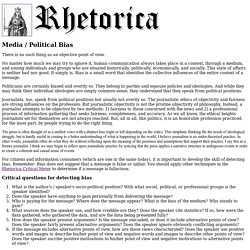
No matter how much we may try to ignore it, human communication always takes place in a context, through a medium, and among individuals and groups who are situated historically, politically, economically, and socially. This state of affairs is neither bad nor good. It simply is. Media Bias Basics. The Double Standard About Bias in Journalism. I made The New York Times last week.
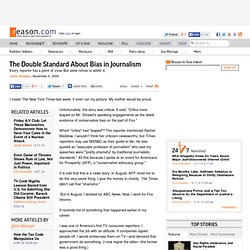
It even ran my picture. My mother would be proud. Unfortunately, the story was critical. It said, "Critics have leaped on Mr. Journalists Denying Liberal Bias, Part One. In spite of overwhelming evidence to the contrary, many journalists still refuse to acknowledge that most of the establishment media tilts to the left.
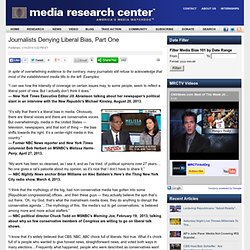
Examples: “I can see how the intensity of coverage on certain issues may, to some people, seem to reflect a liberal point of view. How Media Bias Is Revealed and What to Do About It - Big Journalism. Glasser. Journalism Ethics: Objectivity. In the chapter for last week, Merrill discussed all the ways that journalists can, inadvertently or deliberately, become propagandists -- the opposite of objective observers and reporters.
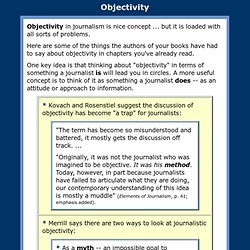
In this week's chapter on general semantics, he says that close attention to the use of language is one way journalists (and everyone else, too) can come as close as humanly possible to truthful communication. General semantics is a way of looking at how people use language and how the words they choose affect human behavior. Probably its best-known idea is that "the map is not the territory. " That is, the word we use to define or describe something is just that -- a word. It is not the thing itself. Public Journalism and the Problem of Objectivity. The Invention of Journalism Ethics: The Path to Objectivity and Beyond - UBC Reports. UBC Reports | Vol. 50 | No. 10 | Nov. 4, 2004 By Stephen J. Ward (McGill-Queen's University Press) Objectivity, Professionalism, and Truth Seeking in Journalism : C.W. Anderson.
UNT talk-Objectivity in Journalism. University of North Texas Nature Writing Symposium talk: “Changing the World One Story at a Time” April 2007 Copyright © 2007 Wendee Holtcamp – bohemian@wendeeholtcamp.com. The Myth of Objectivity in Journalism. Objectivity in Journalism: A Search and a Reassessment. CNN Bias. CNN Bias. CNN = Contains No News. CNN = “Contains No News” ABC asked Rice about Downing Street memo; CNN and Fox passed. Of Sunday morning news program hosts who interviewed Secretary of State Condoleezza Rice on June 19, only ABC's George Stephanopoulos asked Rice about the recently leaked Downing Street memo . The memo contains the recorded minutes of a July 23, 2002, meeting of senior British cabinet officials and advisers and includes British intelligence chief Richard Dearlove's statement, based on meetings with U.S. officials in Washington, that President Bush was determined even then to remove Saddam Hussein from power in Iraq "through military action" and that "the intelligence and facts were being fixed around the policy.
" Though Chris Wallace , host of Fox Broadcasting Co.' CNN Bias. Editor's Note: 04/18/2012 An editorial opinion. CNN Bias. Bias? CNN Headline, Story Call Those Opposed to Raising the Debt Ceiling…‘Wingnuts’ One news outlet that has been frequently criticized for liberal bias is going to have a hard time slithering its way out of this one. Earlier today, CNN Money’s Jeanne Sahadi published an article about America’s ongoing debt ceiling debate. While this is certainly an important subject worth discussing and examining, Sahadi’s headline was startling.